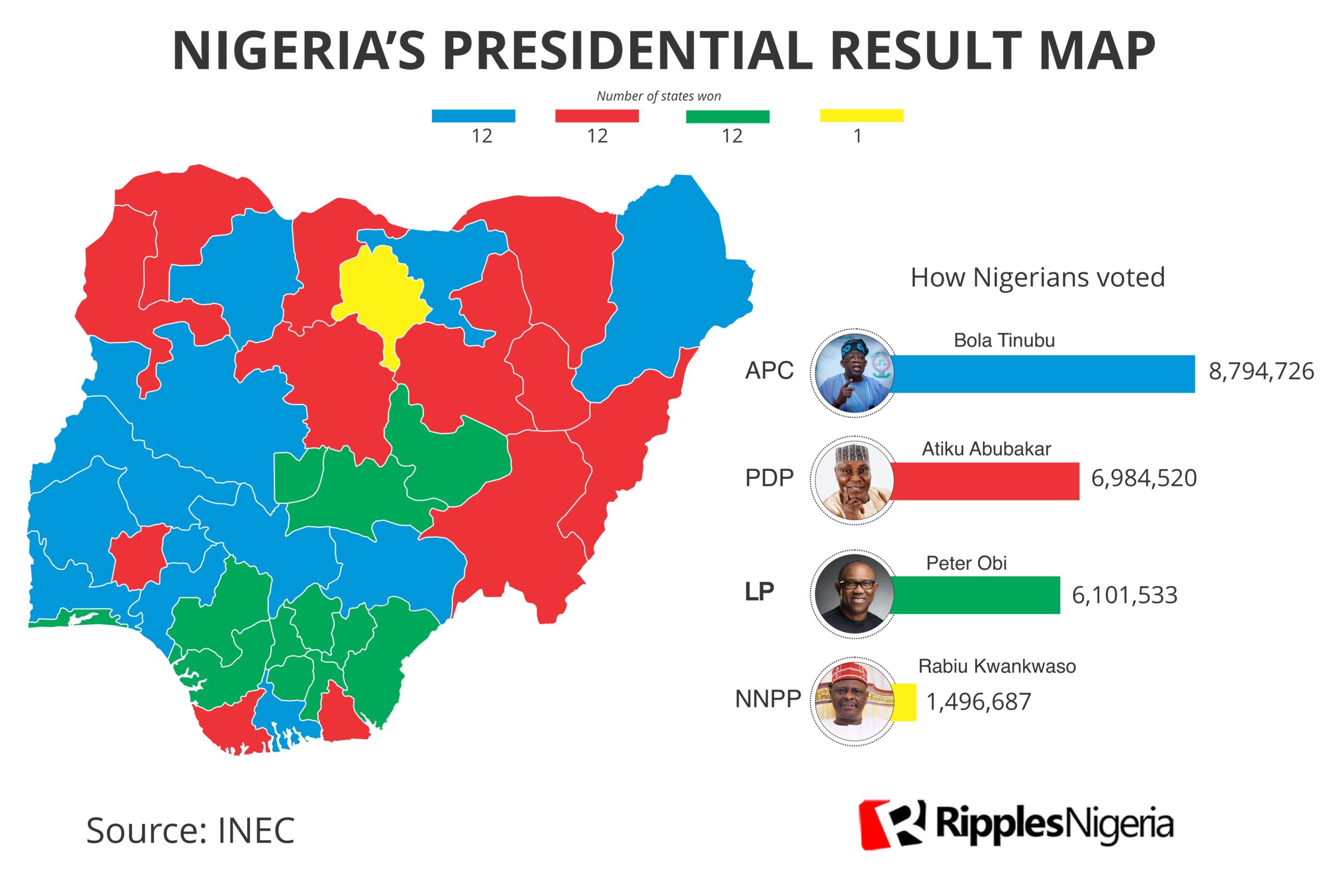Politics
How Nigerians voted for Tinubu to emerge president

The final result of the 2023 presidential election which brought in former Lagos State Governor, Asiwaju Bola Ahmed Tinubu as the new Nigerian President-elect, was made possible by the voting pattern of Nigerians across the country.
The All Progessives Congress (APC) presidential flag bearer was announced the winner in a very tight election by Chairman of the Independent National Electoral Commission (INEC), Professor Mahmood Yakubu, at the International Collation Centre in Abuja in the early hours of Wednesday.
Tinubu won with a total of 8,794,726 votes to lead the election ahead of close contenders, Atiku Abubakar of the Peoples Democratic Party (PDP),and Peter Obi of the Labour Party (LP), who scored 6,984,520 and 6,101,533 votes respectively.
Though the three leading presidential candidates won elections in 12 states each, Tinubu was able to emerge the winner due to what many believe were swing votes in states hitherto held by the PDP which split the votes in the APC’s favour.
The emergence of Obi did not also help the cause of the PDP as his votes in key states tilted the scale in favour of Tinubu by reducing the number of voters who would hitherto have gone to Atiku.
While Tinubu won in states like Ogun, Oyo, Ondo, Kwara, Ekiti, Kogi, Benue, Zamfara and Jigawa, Atiku emerged victorious in Bauchi, Yobe, Gombe, Kaduna, Kebbi, Bayelsa, Adamawa and Akwa Ibom.
On the other hand, Obi won Lagos, Enugu, Cross River, Nasarawa, Imo, Anambra, Abia, Delta and Plateau states as well as the FCT.
READ ALSO:Tinubu sweeps Borno as collation enters final stage
Obi managed to rock the boat by winning in states hitherto held by the PDP including Delta, Abia, Benue, and made serious incursions into the North-Central states by taking Plateau, Nasarawa and the FCT, further decimating the chances for Atiku and creating a chasm for a Tinubu win.
The President-elect was also able to eat deep into the North-East and took Jigawa, Zamfara, Borno and Kebbi, gradually giving daylight between him and other candidates.
Perhaps the deal breaker in the presidential election was the unresolved rift between five PDP governors, infamously called the G-5, led by Governor Nyesom Wike of Rivers State, ably supported by Governor Samuel Ortom of Benue, Seyi Makinde of Oyo, Ifeanyi Ugwuanyi of Enugu, and Okezie Ikpeazu of Abia State, who did everything possible to truncate the chances of their party’s candidate.
And true to their words of not supporting their party, the PDP lost massively in all the states controlled by the G-5 governors with the APC breaking a 25-year jinx in Rivers by becoming the first party to shatter the PDP hegemony in the state.
Governor Ortom, on the other hand, had vowed to support Obi for the presidential election and true to his word, he duly delivered Benue to the LP candidate.
In all of these permutations, it is then no surprise that the voting pattern, the protest votes and the swing votes played a huge role in turning the tide of the 2023 presidential election which saw the emergence of Bola Tinubu as successor to President Muhammadu Buhari.
Join the conversation
Support Ripples Nigeria, hold up solutions journalism
Balanced, fearless journalism driven by data comes at huge financial costs.
As a media platform, we hold leadership accountable and will not trade the right to press freedom and free speech for a piece of cake.
If you like what we do, and are ready to uphold solutions journalism, kindly donate to the Ripples Nigeria cause.
Your support would help to ensure that citizens and institutions continue to have free access to credible and reliable information for societal development.




















